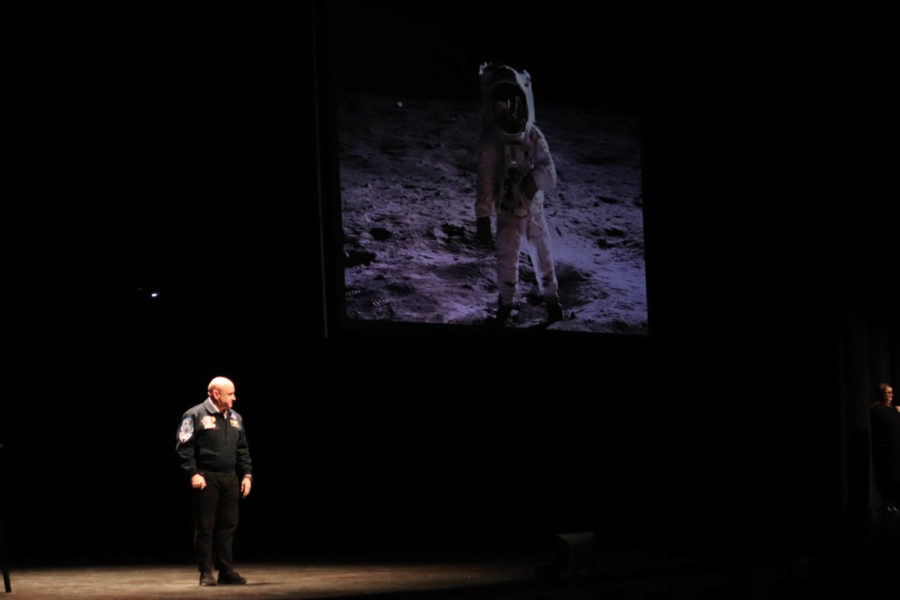Astronaut sets out to inspire Iowa State students
Grant Tetmeyer/Iowa State Daily
Capt. Scott Kelly talks about his upbringing, naval career, time in space and time back on Earth to an almost full C.Y. Stephens Auditorium on Feb. 18.
February 18, 2019
Capt. Scott Kelly shared stories about living in space for a year and what he thinks the future of space exploration looks like to a crowd of students and the public Monday at Stephens Auditorium.
Kelly went on four space flights, commanded the International Space Station on three expeditions and was a member of the yearlong mission to the International Space Station starting in 2015, ultimately setting the American record at the time for the most consecutive days in space.
“Hopefully people will be entertained, inspired and leave here feeling like they got something of value,” Kelly said.
Kelly is a former engineer, military fighter pilot, retired U.S. Navy captain and retired astronaut. During his year in space, Kelly and his identical brother Mark were part of a landmark NASA study on how space affects the human body.
Kelly said after applying to be an astronaut he did not think both he and his brother would receive callbacks in a month for interviews. Three years later, in 1999, Kelly launched into space for the first time.
His year in space paved the way for future space travel and exploration. Kelly wrote the books “Endurance” and “Infinite Wonder,” which share stories and photos from his time in space, and the future of space exploration.
During his lecture, Kelly mentioned the best part about the job for him is that it is difficult.
Kelly said growing up he was not a good student. As a first grader, he thought being an astronaut seemed cool, but did not see it as an actual possibility.
After graduating with a degree in engineering, Kelly learned to fly airplanes. But, Kelly said he originally was not a good pilot, practically crashing an F-14 plane on his first go.
Kelly was eventually successful and said being willing to fail is important. Kelly said a person should never just be comfortable with how things are, and they should look on how to make things a little better.
A main focus of his work was to block out the noise, and to focus on the job, Kelly said.
Kelly was a commander for his second flight, which is when he began participating in the studies of the effects space has on the immune system, body mass, heart and muscles. This research was needed to make progress toward going to Mars in the future.
“There were a lot of changes to my DNA that occurred while I was out there,” Kelly said. “My immune system was in hyper alert while I was in space. My telomeres, which are the ends of our chromosomes that indicates our physical age … as we get older they get shorter and more frayed. They actually got better in space.”
Kelly said 7 percent of his DNA changed and never went back to how it was before going to space.
A main discovery Kelly said he made while in space was that we are all a part of one humanity, planet earth, and that we have to take care of it. After spending a year in space, Kelly said he was inspired, believing that if you can dream it, you can achieve it.







